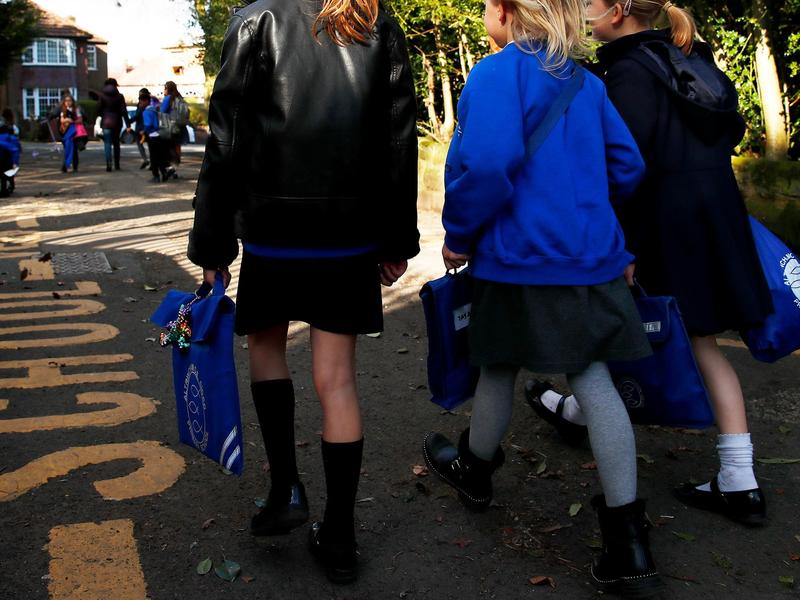 In this March 20, 2020 photo, children walk home from Altrincham CE aided primary school after the government's policy to close all schools due to the coronavirus pandemic in Altrincham, United Kingdom. (CLIVE BRUNSKILL / GETTY IMAGES VIA BLOOMBERG)
In this March 20, 2020 photo, children walk home from Altrincham CE aided primary school after the government's policy to close all schools due to the coronavirus pandemic in Altrincham, United Kingdom. (CLIVE BRUNSKILL / GETTY IMAGES VIA BLOOMBERG)
LONDON / LIMA / DAKAR / CAPE TOWN / MEXICO CITY / RIO DE JANEIRO / ABUJA / BOGOTA / ROME / BERLIN / HAVANA - Restrictions on class sizes will be lifted to allow English schools, colleges and nurseries to fully reopen in September, at the start of the next academic year, Education Secretary Gavin Williamson said.
The British government will effectively ditch its air bridge plans and simply end coronavirus quarantine rules for those arriving from 75 countries so that people can go on holiday, the Telegraph newspaper reported.
Measures will remain in place to reduce the risk of transmission of coronavirus, with schools asked to keep children in class or year-group “bubbles” of as many as 240 children, and older students encouraged to keep their distance from each other and staff.
The return to full-time education is a crucial part of the UK government strategy for economic revival. Boris Johnson’s government is trying to persuade schools to return to normal, amid concerns that pupils are falling behind in their education and parents are unable to work effectively while educating their children.
Under the plans, mobile testing units will be deployed to check schools with localized outbreaks and schools will be expected to have plans in place to offer remote education to pupils who are self-isolating at home.
The maximum size of classes for children aged between five and 11 will be doubled to 30 pupils in September, Williamson told the House of Commons. Restrictions on group sizes will be lifted from July 20 for nurseries and childminders.
The government said the UK would shortly lift a ban on non-essential travel to nearly all EU destinations, the British territories including Bermuda and Gibraltar, and Turkey, Thailand, Australia and New Zealand.
Asked about the report, a spokesman for Johnson said: "As we set out earlier this week ... we will be easing health measures at the border by allowing passengers arriving from specific countries and territories to be exempted from self-isolation requirements."
He said the next steps in the policy would be set out this week.
Johnson's government has been grappling with how to open up international travel after it imposed a 2-week quarantine for arrivals, which has added to the woes of the tourism and travel industry.
As of Wednesday morning, 313,483 people have tested positive for the disease in Britain, a daily increase of 829, according to the department.
ALSO READ: Sweden launches commission to investigate coronavirus response
Africa
The World Health Organization (WHO) does not think there are manifold undetected coronavirus infections in Africa with people dying unreported, the regional director of the organisation said on Thursday.
"We think that there is a certain underestimation of cases," Matshidiso Moeti told a news conference, adding that the WHO was working with countries to improve their surveillance.
Africa has reported 416,063 confirmed coronavirus cases with 10,297 deaths, while 196,944 patients have recovered, according to a Reuters tally based on government statistics and WHO data.
Belgium
Cinemas in Belgium reopened Wednesday as the country entered phase 4 of deconfinement measures.
Under this phase, the number of social contacts allowed is increased from ten to 15 people per individual and per week.
Cultural events can now resume with an audience of up to 200 people indoors and 400 outdoors, provided that the health and safety rules are respected.
Weddings, funerals and cremations can now be attended by a maximum of 200 people. The limit is expected to be increased to 400 people from Aug 1.
Belgium has so far reported 61,509 confirmed cases and 9,754 deaths, according to the Belgian health institute Sciensano.
Brazil
Brazil surpassed 60,000 coronavirus deaths on Wednesday, the Ministry of Health said, citing a recent wave of contamination in Southern and Midwestern areas of the country.
A total of 1,038 additional deaths were registered in the past 24 hours, taking the overall number of fatalities to 60,632, the ministry said, updating the 60,610 tally disclosed earlier on Wednesday to add data from Rio Grande do Sul state.
Total confirmed cases were revised to 1,448,753 from 1,447,523, marking a daily rise of 46,712 from Tuesday and making Brazil the country with the second worst outbreak in the world behind the United States.
The number of deaths in the South and the Midwest regions grew by 37 percent and 36 percent, respectively, in the epidemiological week ended last Saturday, the ministry said. In the South, the worsening scenario comes after states such as Rio Grande do Sul and Santa Catarina were the first to lift social distancing measures.
Brazil extended a temporary ban on the entry of foreigners for another 30 days, on the recommendation of the Brazilian Health Regulatory Agency.
Meanwhile, Brazil's lower house of Congress approved a constitutional amendment to postpone municipal elections from Oct 4 and Oct 25 to Nov 15 and Nov 29 due to the pandemic.
Separately, a potential coronavirus vaccine developed by China's Sinovac will be tested in Brazil by 12 research centers in six Brazilian states, the governor of Sao Paulo state, Joao Doria, said, adding the trials still need to be approved by local health vigilance agency Anvisa.
Bulgaria
The number of confirmed COVID-19 cases in Bulgaria topped 5,000 after a sharp rise in new cases in the last 24 hours, official figures showed on Thursday.
A total of 165 newly confirmed cases were reported, the second highest daily increase since Bulgaria reported its first COVID-19 case on March 8, the health ministry said, pushing the tally to 5,154.
The number of recoveries rose by 46 to 2,722, and the death toll saw a slight increase from 230 to 232, the ministry said.
Chile
Chile on Wednesday said the total number of people who have tested positive for COVID-19 climbed to 282,043, as 2,650 new cases were detected over the past 24 hours.
The death toll rose to 5,753 after 65 more deaths were registered in the same period, the Health Ministry said.
Currently, there are 30,847 active cases. According to Health Minister Enrique Paris, lockdown measures in the capital Santiago and its metropolitan area, as well as other regions, will continue for another week.
Colombia
Colombia's confirmed coronavirus infections tipped across the 100,000 case threshold on Wednesday, as the country's quarantine measures roll on and intensive care units fill.
Confirmed coronavirus cases now number 102,009, the Health Ministry said, 54,941 of which are active. Some 3,470 people have died.
Wednesday also marked the highest-ever daily increase in confirmed cases with an uptick of 4,163.
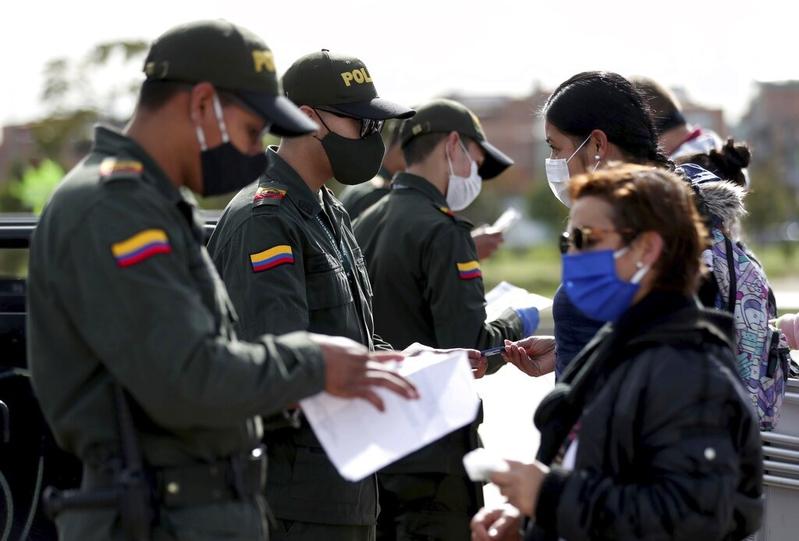 Police check residents' identifications or permissions to work before they are allowed into a public bus station in the Kennedy area of Bogota, Colombia, June 30, 2020. (FERNANDO VERGARA / AP)
Police check residents' identifications or permissions to work before they are allowed into a public bus station in the Kennedy area of Bogota, Colombia, June 30, 2020. (FERNANDO VERGARA / AP)
Cuba
Cuba said on Wednesday it will begin easing a pandemic lockdown on Havana on Friday, and most of the rest of the country will move to phase two of a three-phase process towards normalization.
The capital's 2.2 million residents will once more be able to move around on public and private transport, go to the beach and other recreation centers, and enjoy a seaside drive just in time for the summer break. They can also dine and have a drink, although social distancing and wearing masks remain mandatory. Optional medical and other services will also resume.
Each phase of the reopening allows capacity at venues to increase from an initial 50 percent. Interprovincial transportation begins during phase two, while phase three includes schools reopening.
On Wednesday the country opened a group of isolated resort keys to international tourism. Phase three broadens international travel depending on risk.
Cuba has so far reported 2,348 confirmed cases and 86 deaths, according a Johns Hopkins University tally. Only a handful of cases were reported in Cuba last month, all but a few in Havana.
Denmark
Another herd of mink has been found to be infected with COVID-19, the Danish Veterinary and Food Administration (DVFA) said in a press release on Wednesday.
It is the third herd of mink found to be infected with COVID-19.
The animals came under scrutiny after people connected to the mink farm, in Hjorring municipality of North Jutland, 356 km northwest of Copenhagen, reported to DVFA that they had been infected with COVID-19. Following a massive round of testing of the animals on Monday, more than half of the 10,000-strong mink herd were discovered to be infected with the coronavirus. The infected mink will be culled, according to the press release.
None of the three infected herds were among the 120 herds across the country that were being screened for COVID-19, according to the press release.
The total number of confirmed COVID-19 cases in Denmark stands at 12,794, with 606 deaths, according to the update from the Statens Serum Institut on Wednesday.
Egypt
Egypt reported on Wednesday 1,503 new COVID-19 infections, bringing the total number of infections in the country to 69,814, the Health Ministry said.
Another 81 deaths were reported, raising the death toll to 3,034, while 421 more recoveries were registered, bringing the total number of recoveries to 18,881, the ministry's spokesman Khaled Megahed said in a statement.
Meanwhile on Wednesday, Egypt received two flights with about 300 tourists from Ukraine as the country started resuming international flights after more than three months of suspension over COVID-19 concerns.
"Several other flights carrying tourists from Ukraine, Switzerland and Belarus will arrive in the coming few days," said the Ministry of Tourism and Antiquities said in a statement.
READ MORE: Egypt reopens airports, tourist sites after 3-month COVID-19 closure
France
All indicators are showing the coronavirus is under control in mainland France after the some 200 clusters identified since lockdown measures were loosened were contained, French Health Minister Olivier Veran said in an interview on RTL radio.
The government is putting in place new restrictions in French Guiana, where cases have increased and is increasing nationwide testing this week to around 300,000. Any reopening of night clubs would be problematic, Veran said.
The number of deaths in France rose by 18 from the previous day to stand at 29,861, the country's health department said on Wednesday. Confirmed cases rose by 918 to 165,719.
Germany
Germany’s coronavirus infection rate remained below the key threshold of 1.0, and the number of new cases stayed much lower than the levels at the height of the outbreak.
The reproduction factor - or R value - edged higher to 0.86 on Wednesday from 0.83 the previous day, according to the latest estimate by the country’s health body, the Robert Koch Institute (RKI).
There were 475 new cases in the 24 hours through Thursday morning, up from 376 the previous day and bringing the total to 195,893, according to data from Johns Hopkins University. Deaths rose by five to 8,995.
According to data from RKI on Thursday, the number of confirmed cases increased by 503 to 195,228 while the reported death toll rose by 9 to 8,994.
Italy
Italy's active coronavirus infections dropped by 308 cases on Wednesday to 15,255 while 21 more deaths were reported by the Health Ministry, bringing the toll to 34,788.
Overall, 182 new COVID-19 cases were registered in the last 24 hours, taking the tally to 240,760, the ministry said.
Wednesday saw 469 new recoveries, bringing the number of recoveries to 190,717.
Kenya
Kenya recorded the highest number of COVID-19 infections in a single day on Wednesday, with cases seen to be rising ahead of its anticipated reopening of the economy.
Chief Administrative Secretary of the Ministry of Health Rashid Aman announced that the country recorded 307 new cases, bringing the total caseload to 6,673.
He attributed the surge in cases in part to the anticipated lifting of the restrictions, which some citizens have been seen flouting, such as not wearing masks and not maintaining social distancing.
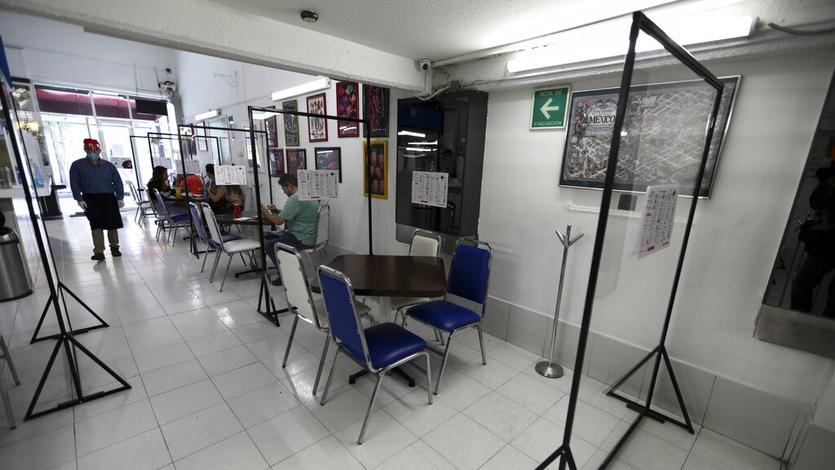 Separated by transparent dividers, customers eat in a restaurant while keeping their distance to help curb the spread of the new coronavirus, in Mexico City, July 1, 2020. (EDUARDO VERDUGO / AP)
Separated by transparent dividers, customers eat in a restaurant while keeping their distance to help curb the spread of the new coronavirus, in Mexico City, July 1, 2020. (EDUARDO VERDUGO / AP)
Mexico
Mexico’s COVID-19 deaths rose by 741 to reach 28,510, leading the country to overtake Spain and have the world’s sixth most-deadly outbreak, according to data released by the Health Ministry Wednesday night.
Confirmed cases rose by 5,681 to 231,770. Deaths and cases in Mexico have increased steadily in recent weeks as Latin America has emerged as a hot spot for the pandemic. The country is also likely to soon overtake France, which has 29,864 deaths, according to data from Johns Hopkins University.
The numbers from Mexico’s Health Ministry don’t reflect data from only the previous 24 hours, as it takes longer for it to gather information from hospitals on coronavirus patients. Experts have questioned the government’s tracking of the virus, as even the ministry has acknowledged actual cases are much higher.
Meanwhile, Finance Minister Arturo Herrera said in a video posted to Twitter on Wednesday that he is at home recovering "satisfactorily" after he was diagnosed with coronavirus a few days ago.
Morocco
Morocco registered 103 new COVID-19 cases on Wednesday, raising the tally in the North African country to 12,636, the Ministry of Health said.
The death toll remained at 228 as no additional fatalities were recorded in the last 24 hours, said Hind Ezzine, head of the department of epidemic diseases of the Ministry of Health, at a regular press briefing.
The number of recoveries rose by 106 to 9,026, Ezzine said.
Nigeria
Nigeria will resume domestic flights from July 8, the government said on Wednesday, as Africa's most populous country relaxes novel coronavirus restrictions despite mounting cases and deaths.
The airports for the capital Abuja and Lagos will open on July 8, while a handful of others are set to open July 11 and the rest on July 15, the government said on its official Twitter account.
No date was given for the resumption of international flights.
Nigeria had confirmed more than 25,000 coronavirus cases and almost 600 deaths as of Wednesday, with little sign of the outbreak slowing.
Peru
Peru entered the final stage of its economic reopening on Wednesday after ending a months-long lockdown to try and contain the spread of the novel coronavirus.
The government said in a decree that "phase 3" of economic reactivation, which includes 96 percent of production activities, will restart all mining activities, industrial sectors and commerce, though they must comply with health protocols for the pandemic.
Restaurants and shops will reopen to cater to a limited capacity of customers. Officials are also weighing health protocols for resuming domestic air and land transport.
Peru reported on Wednesday 3,264 new COVID-19 cases in the previous 24 hours, pushing the tally to 288,477, while the death toll has risen to 9,860, said the Health Ministry.
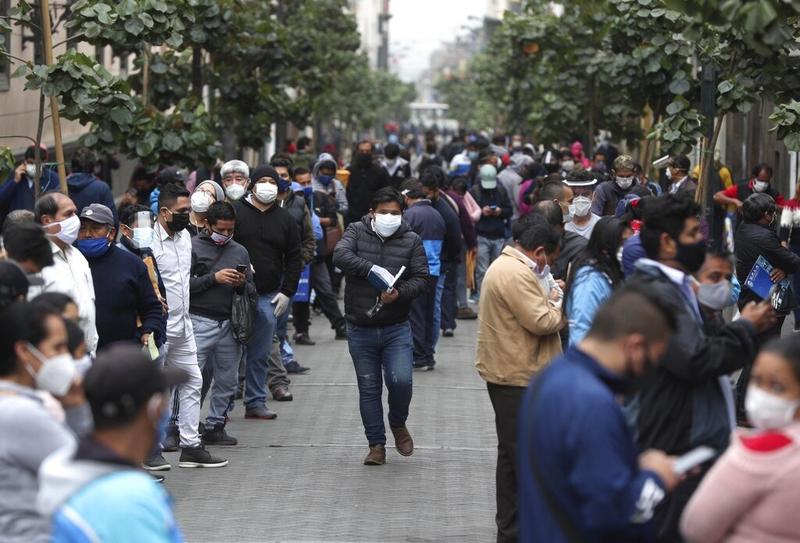 People wait in line for some businesses to reopen in downtown Lima, Peru, July 1, 2020 as the country entered the final stage of its economic reopening. (MARTIN MEJIA / AP)
People wait in line for some businesses to reopen in downtown Lima, Peru, July 1, 2020 as the country entered the final stage of its economic reopening. (MARTIN MEJIA / AP)
Russia
Russian Prime Minister Mikhail Mishustin said on Thursday the government would consider increasing budget spending by 1.8 trillion roubles (US$25.6 billion) to fight the coronavirus and support the economy.
Some economists have said Russia's regulations surrounding budget spending have hindered its ability to adequately fund anti-crisis measures.
Russia on Thursday reported 6,760 new cases of the novel coronavirus, pushing its nationwide tally to 661,165.
The authorities said another 147 people died in the last 24 hours, bringing the official death toll to 9,683.
Rwanda
Rwanda's Ministry of Health will on Thursday launch a COVID-19 street testing survey in the capital Kigali and at its entry points to probe the COVID-19 situation in the city, a senior health official said Wednesday.
It is a randomized testing and Kigali was chosen to do the survey due to mass movement in the city, Minister of State in charge of Primary Healthcare Tharcisse Mpunga said during a news program of Rwanda Television.
The testing will provide factual information about the COVID-19 situation in Kigali and necessary response measures, he said.
The Health Ministry on Wednesday reported 17 new cases, including seven in Kigali. So far, the central African country has registered 1,042 confirmed cases, including 480 recoveries and three deaths.
Sierra Leone
Doctors treating coronavirus patients in Sierra Leone will go on strike within 24 hours after the government failed to pay promised allowances, their union said on Wednesday.
The Sierra Leone Medical and Dental Association (SLMDA) said in a statement the strike would continue until the allowances are paid in full, without specifying how much the doctors are owed.
The union also complained that a memorandum of understanding between the government and doctors working in COVID-19 isolation and treatment centres expired on Tuesday and has not been renewed.
Sierra Leone has recorded 1,462 cases of the virus, including 60 deaths, far fewer than many other West African countries despite its fragile health infrastructure. The association said two doctors have died of COVID-19 related causes since the outbreak while more than 100 health workers have also been infected.
South Africa
South Africa reported 8,124 new COVID-19 cases in the past 24 hours, the highest single-day surge since the outbreak in early March, bringing its national tally to 159,333, Health Minister Zweli Mkhize said Wednesday.
Another 92 deaths were reported, raising the death toll to 2,749, according to Mkhize.
"Regrettably, we report a further 92 COVID-19 related deaths -- 17 from Eastern Cape, 28 from Gauteng, 10 from KwaZulu Natal and 37 from Western Cape. This brings the total deaths to 2,749," Mkhize added.
A total of 76,025 recoveries have so far been reported, the minister said.
US
US daily coronavirus cases topped 50,000 for the first time ever as governors of US states hit hardest by the resurgent coronavirus halted or reversed steps to reopen their economies on Wednesday, led by California, the nation's most populous state and a new epicenter of the pandemic.
New cases rose by 51,374 on Wednesday, according to data from Johns Hopkins University and Bloomberg News.
READ MORE: Urgent plea made as US COVID-19 cases spiral
According to a Reuters tally, Texas again topped its previous record with 8,076 new cases while South Carolina reported 24 more deaths, a single-day high for the state. Tennessee and Alaska also had record numbers of new cases on Wednesday.
More than 40 school principals in the South Bay are in quarantine after being exposed to COVID-19 during an in-person meeting held by the Santa Clara Unified School District, the San Francisco Chronicle reported.
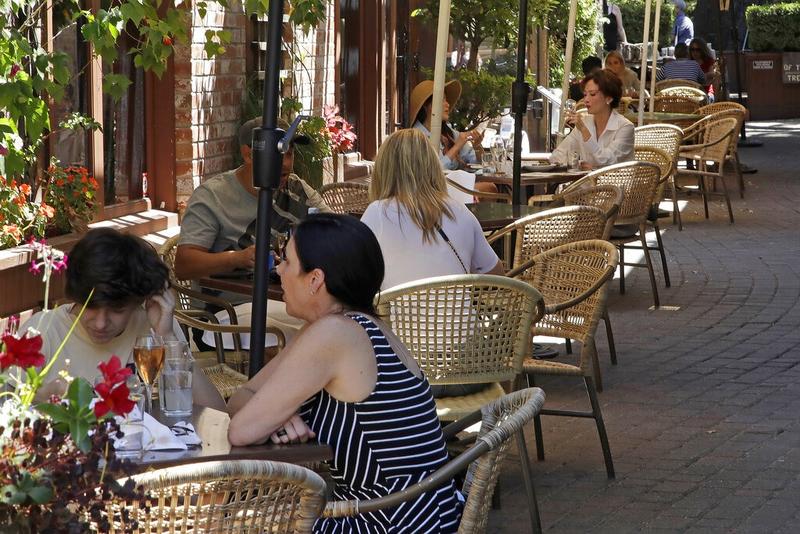 Customers dine outdoors at a restaurant in Walnut Creek, California, on July 1, 2020. (BEN MARGOT / AP)
Customers dine outdoors at a restaurant in Walnut Creek, California, on July 1, 2020. (BEN MARGOT / AP)
California Governor Gavin Newsom ordered the closure of bars, bans on indoor dining and other restrictions in 19 counties, affecting over 70 percent of the state's population.
New Mexico Governor Michelle Grisham extended the state's emergency public health order through July 15, saying that authorities would "aggressively" enforce mandatory mask rules.
In Indiana, Republican Governor Eric Holcomb halted his state's phased reopening until at least mid-July.
New York Mayor Bill de Blasio said he would postpone a plan to allow indoor restaurant dining beginning Monday.
Zimbabwe
The number of confirmed COVID-19 cases in Zimbabwe rose to 605 after 14 new cases were recorded on Wednesday.
The number of recoveries has risen to 166 after three more recoveries were reported while the death toll remained at seven.


